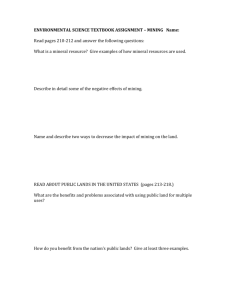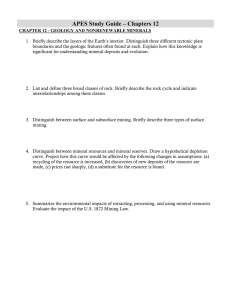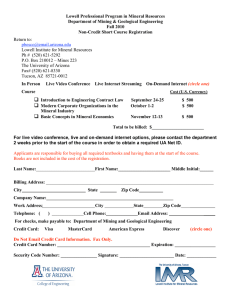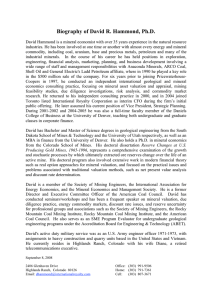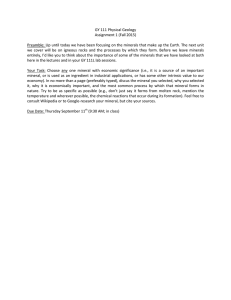Subject: Economics of Metal Industries and Markets ... Course Title: Economics of Metal Industries and Markets
advertisement
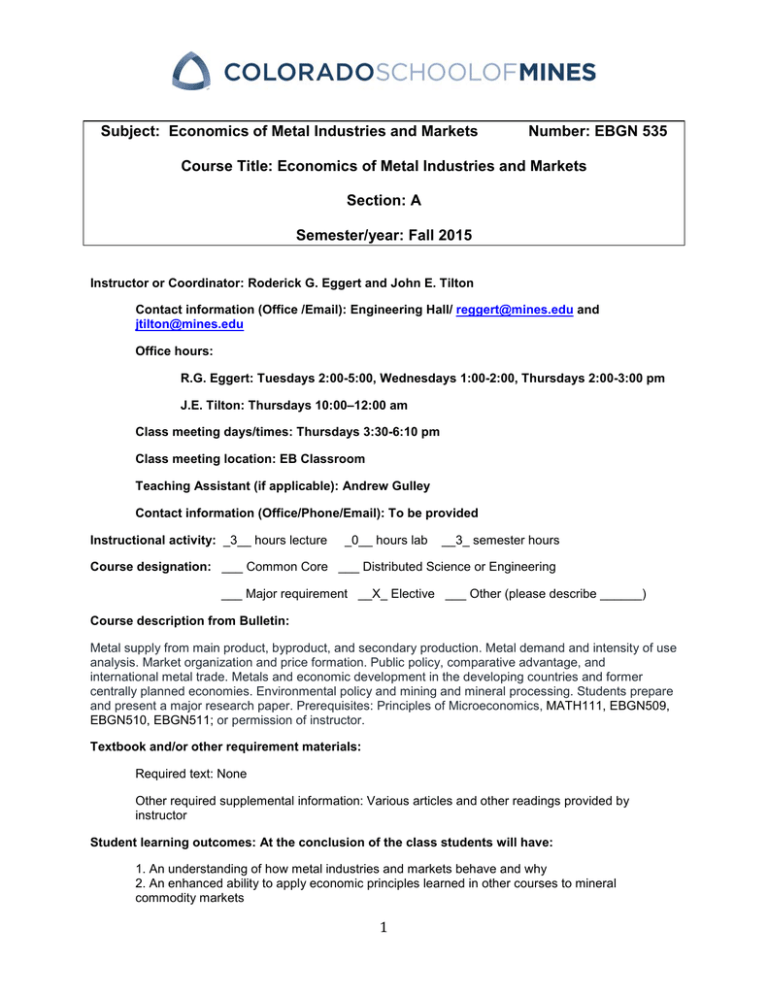
Subject: Economics of Metal Industries and Markets Number: EBGN 535 Course Title: Economics of Metal Industries and Markets Section: A Semester/year: Fall 2015 Instructor or Coordinator: Roderick G. Eggert and John E. Tilton Contact information (Office /Email): Engineering Hall/ reggert@mines.edu and jtilton@mines.edu Office hours: R.G. Eggert: Tuesdays 2:00-5:00, Wednesdays 1:00-2:00, Thursdays 2:00-3:00 pm J.E. Tilton: Thursdays 10:00–12:00 am Class meeting days/times: Thursdays 3:30-6:10 pm Class meeting location: EB Classroom Teaching Assistant (if applicable): Andrew Gulley Contact information (Office/Phone/Email): To be provided Instructional activity: _3__ hours lecture _0__ hours lab __3_ semester hours Course designation: ___ Common Core ___ Distributed Science or Engineering ___ Major requirement __X_ Elective ___ Other (please describe ______) Course description from Bulletin: Metal supply from main product, byproduct, and secondary production. Metal demand and intensity of use analysis. Market organization and price formation. Public policy, comparative advantage, and international metal trade. Metals and economic development in the developing countries and former centrally planned economies. Environmental policy and mining and mineral processing. Students prepare and present a major research paper. Prerequisites: Principles of Microeconomics, MATH111, EBGN509, EBGN510, EBGN511; or permission of instructor. Textbook and/or other requirement materials: Required text: None Other required supplemental information: Various articles and other readings provided by instructor Student learning outcomes: At the conclusion of the class students will have: 1. An understanding of how metal industries and markets behave and why 2. An enhanced ability to apply economic principles learned in other courses to mineral commodity markets 1 3. Stronger analytical skills and research capabilities 4. Improved communication skills, especially writing skills Brief list of topics covered: Course outline provided separately. Policy on academic integrity/misconduct: The Colorado School of Mines affirms the principle that all individuals associated with the Mines academic community have a responsibility for establishing, maintaining and fostering an understanding and appreciation for academic integrity. In broad terms, this implies protecting the environment of mutual trust within which scholarly exchange occurs, supporting the ability of the faculty to fairly and effectively evaluate every student’s academic achievements, and giving credence to the university’s educational mission, its scholarly objectives and the substance of the degrees it awards. The protection of academic integrity requires there to be clear and consistent standards, as well as confrontation and sanctions when individuals violate those standards. The Colorado School of Mines desires an environment free of any and all forms of academic misconduct and expects students to act with integrity at all times. Academic misconduct is the intentional act of fraud, in which an individual seeks to claim credit for the work and efforts of another without authorization, or uses unauthorized materials or fabricated information in any academic exercise. Student Academic Misconduct arises when a student violates the principle of academic integrity. Such behavior erodes mutual trust, distorts the fair evaluation of academic achievements, violates the ethical code of behavior upon which education and scholarship rest, and undermines the credibility of the university. Because of the serious institutional and individual ramifications, student misconduct arising from violations of academic integrity is not tolerated at Mines. If a student is found to have engaged in such misconduct sanctions such as change of a grade, loss of institutional privileges, or academic suspension or dismissal may be imposed. The complete policy is online. Grading Procedures: Grades are based on the student’s performance on weekly quizzes, a final exam, and a group research project. Grades will be assigned according to the following weighting: quizzes and class participation – 20%; final exam – 40%; group research project – 40%. Coursework Return Policy: Quizzes, the exam, and the draft and final versions of the research paper will be returned within in two weeks along with suitable comments to help the student understand how to improve his or her performance. Absence Policy: Students are expected to attend class. The quiz grade is the average of the best five quiz grades. There are no make-up quizzes for those missed. If a student has to be absent during the scheduled exam and has an approved excuse, he or she will have the opportunity to take a make-up exam. Homework: NA Common Exam Policy: NA Detailed Course Schedule: A detailed course reading and assignment list is provided separately. 2 Attachment METAL INDUSTRIES AND MARKETS Reading and Assignment List EBGN 635 R. G. Eggert Email: reggert@mines.edu Tel: 303.273-3981 Fall 2015 J. E. Tilton Email: jtilton@mines.edu Tel: 303.862.9663 (Home) Course Objectives Increase understanding of how metal industries and markets behave and why Apply economic principles learned in other courses to mineral commodities Enhance critical analytical skills and especially research capabilities Improve communication skills, especially written skill Assignments and Grades Quizzes and class participation 20 percent Exam 40 percent Projects 40 percent Deadlines Exam October 22 Paper presentations November 5 Papers due November 2 November 12 November 19 Revised papers due December 10 Topics and Readings August 27 Introduction, Course Overview, Basic Economic Concepts 3 Maxwell, Philip, 2013, “Mineral Economics—An Introduction,” in Philip Maxwell, ed., Mineral Economics: Australian and Global Perspectives, 2nd Edition (Carlton, Victoria: Australasian Institute of Mining and Metallurgy), Ch. 1, pp. 1-7. September 3 Mineral Commodity Demand Tilton, John E., and Juan Ignacio Guzmán, 2015, “Demand,” unpublished book chapter, 52 pp. Humphreys, David, 2015, “China Changes Everything,” The Remaking of the Mining Industry (Houndmills, Hampshire, UK: Palgrave MacMillan), Ch. 2, pp. 38-60. September 10 Mineral Commodity Supply Tilton, John E., and Juan Ignacio Guzmán, 2015, “Supply,” unpublished book chapter, 53 pp. Gomez, Fernando, Juan Ignacio Guzmán, and John E. Tilton, 2007, “Copper Recycling and Scrap Availability,” Resources Policy, Vol. 32, pp. 183-190. September 17 Mineral Markets and Prices Tilton, John E., and Juan Ignacio Guzmán, 2015, “Markets and Prices,” unpublished book chapter, 53 pp. September 24 Rents and Public Policy – International Mineral Trade Tilton, John E., and Juan Ignacio Guzmán, 2015, “Public Policy, Rents, and Taxation,” unpublished book chapter, 32 pp. Tilton, John E., and Juan Ignacio Guzmán, 2015, “Mineral Commodity Trade and Comparative Advantage in Mining,’ unpublished book chapter, 47 pp. October 1 Mining and Economic Development: The Resource Curse Tilton, John E., and Juan Ignacio Guzmán, 2015, “Mining and Economic Development,’ unpublished book chapter, 39 pp. Sachs, Jeffrey D., and Andrew M. Warner, 2001, “Natural Resources and Economic Development: The Curse of Natural Resources,” European Economic Review, Vol. 45, pp. 827-838. October 8 Minerals Availability and Depletion Tilton, John E., and Juan Ignacio Guzmán, 2015, “Depletion and Scarcity,’ unpublished book chapter, 41 pp. Eggert, Roderick G., 2011, “Strategic and Critical Minerals Policy: Domestic Minerals Supplies and Demands in a Time of Foreign Supply Disruptions,” Testimony before the Subcommittee on Energy and Mineral Resources, Committee on Natural Resources, U.S. House of Representatives, Washington, DC, May 24, 10 pp. October 15 Mining, the Environment, and Sustainable Development / Review for Exam 4 Tilton, John E., and Juan Ignacio Guzmán, 2015, “The Environment and Sustainable Development,’ unpublished book chapter, 38 pp. Eggert, Roderick G., 2013, “Mining, Sustainability and Sustainable Development,” in Philip Maxwell, ed., Mineral Economics: Australian and Global Perspectives, 2nd Edition (Carlton, Victoria: Australasian Institute of Mining and Metallurgy), Ch. 13. Tilton, John E., 2003, On Borrowed Time? Assessing the Threat of Mineral Depletion (Washington, DC: Resources for the Future), Ch. 7, pp. 101-121. October 22 Exam - Project Teams Meet October 29 Discuss Exam - Project Teams Meet November 2 Papers due November 5 Paper Presentations November 12 Paper Presentations November 19 Paper Presentations November 26 Holiday – Thanksgiving December 3 Project Teams Meet with Professor December 10 No Class. Revised papers due 5
